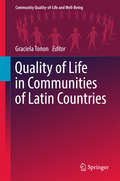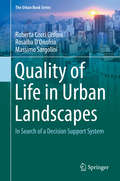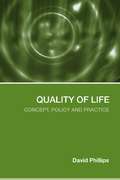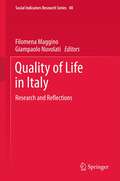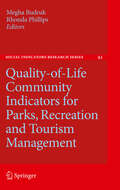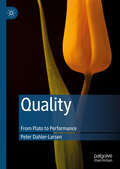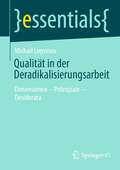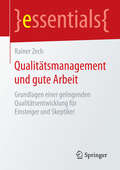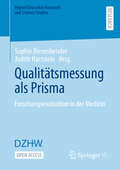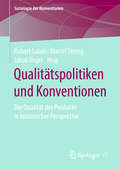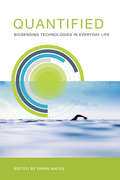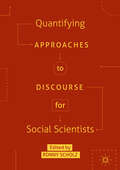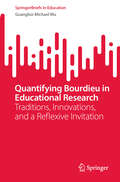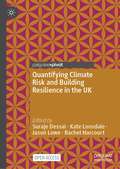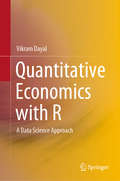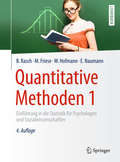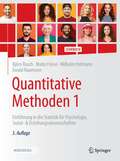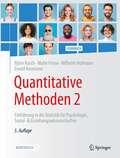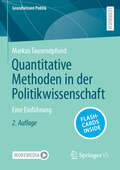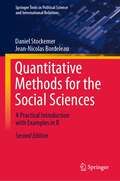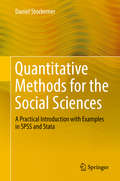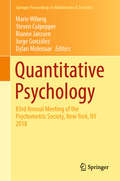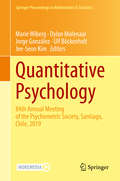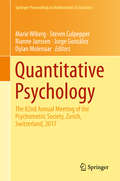- Table View
- List View
Quality of Life in Communities of Latin Countries
by Graciela TononThis book presents a reconfiguration of the concepts of community in Latin countries as well as the community quality of life and well-being of different groups: children, young people, older adults, migrants. The traditional concept of community has changed together with the way people participate in community spaces. Community nowadays is more than a geographic concentration; it is related to social support, inter-subjectivity, participation, consensus, common beliefs, joint effort aiming at a major objective, and intense and extensive relationships. This volume presents unique experiences about culture, social development, health, water, armed conflicts, the digital media, and sports within communities, written by authors from Latin countries. This volume is a valuable resource for researchers, students, and policy makers in quality of life studies.
Quality of Life in Japan: Contemporary Perspectives on Happiness (Quality of Life in Asia #13)
by Ming-Chang Tsai Noriko IwaiThis edited volume approaches the life experiences and well-being of Japanese people from an empirical perspective. It explores the current trend of happiness among Japanese over time and examines the association of income, lifestyle, and perceived life conditions using modern econometric models with supplementary qualitative observations. Issues relating to ageing, gender, household division of labour, and emigration are also examined to provide a wide scope of results based on both survey and field methods for culturally sensitive researchers. Going beyond the conventional cultural interpretation of the uniqueness of the Japanese case, this book provides timely, empirical evidence for understanding how the various social groups comprising the Japanese population have enjoyed a better quality of life, while some groups are very dissatisfied with social arrangements and have elected to emigrate. The book is a pioneering endeavour to reveal the detailed structure of quality of life and well-being in Japanese society.
Quality of Life in Urban Landscapes: In Search of a Decision Support System (The Urban Book Series)
by Roberta Cocci Grifoni Rosalba D'Onofrio Massimo SargoliniThis volume introduces an innovative tool for the development of sustainable cities and the promotion of the quality of life of city inhabitants. It presents a decision-support system to orient public administrations in identifying development scenarios for sustainable urban and territorial transformations. The authors have split the volume into five parts, which respectively describe the theoretical basis of the book, the policies in question and indicators that influence them, the decision-support system that connects indicators to policies, the case study of Ancona, Italy, and potential future directions for this work. This volume is based on transdisciplinary research completed in May 2016 that involved about 40 researchers at The University of Camerino, Italy and other European universities. With purchase of this book, readers will also have access to Electronic Supplementary Material that contains a database with groups of indicators of assessment of urban quality of life and a toolkit containing the data processing system and management information system used in the book’s case study.
Quality of Life: Concept, Policy and Practice
by David PhillipsQuality of life is one of the most important issues facing the world today and is central to the development of social policy. This innovative book discusses this crucial topic, assessing the criteria for judging attempts to raise quality of life, including the satisfaction of basic and social needs, autonomy to enjoy life and social connectivity. It considers key topics such as: individual well-being and health-related quality of life human needs - living fulfilling and flourishing lives poverty and social exclusion social solidarity, altruism and trust within communities. Quality of Life is the first systematic presentation of this subject from both individual and collective perspectives. It provides a powerful overview of a concept which is becoming increasingly prominent in the social sciences and is essential reading for students of social policy, sociology and health studies.
Quality of life in Italy
by Filomena Maggino Giampaolo NuvolatiThe outcome of the first Italian National Conference on Quality of Life, this volume is full of cogent analysis of topics and issues related to well being and quality of life, including focused papers on specific population groupings and discrete themes. Held in Florence in September 2010, the conference saw the creation of the Italian Association of Quality of Life Studies, devised as a forum for this varied field of research with a rapidly expanding profile in the context of the continuing financial crisis. The papers address a number of recognized quality-of-life concerns, including public health, wealth distribution, employment, political participation and the perception of crime. Contributors deploy innovative methods of analyzing official statistics that result in more complex and multidimensional indicators. Some papers provide data on other European nations that allow for comparative assessment, while others set out fresh approaches to evaluating quality of life itself. Highly relevant not just to academics, but to policy makers and practitioners in a range of sectors, this publication explores important aspects of a crucial contemporary subject.
Quality-of-Life Community Indicators for Parks, Recreation and Tourism Management
by Rhonda Phillips Megha BudrukWhile community quality-of-life indicators are gaining much needed attention in both scholarly work and practice, their application in the areas of parks, recreation and tourism management are not as well known. The applicability of indicator systems for natural resource and natural resource area management within the parks and recreation arena is very high, including urban parks and recreation programs and their influence on quality of life. Tourism is also an area that needs much more work in terms of assessing impacts as well as developing indicators for gauging progress in the long term. All three areas are an integrated discipline and most programs throughout the developed world are housed co-jointly. There are several researchers across the globe who are conducting innovative work in these areas. The editors feel that a volume on the topic will spur additional interests as well as serve to lead the research efforts.
Quality: From Plato to Performance
by Peter Dahler-LarsenThe notion of quality features prominently in contemporary discourse. Numerous ratings, rankings, metrics, auditing, accreditation, benchmarking, smileys, reviews, and international comparisons are all used regularly to capture quality. This book paves the way in exploring the socio-political implications of evaluative statements, with a specific focus on the contribution of the concept of quality to these processes. Drawing on perspectives from the history of ideas, sociology, political science and public management, Dahler-Larsen asks what is the role of quality, and more specifically quality inscriptions, such as measurement? What do they accomplish? And finally, as a consequence of all this, does the term quality make it possible to deal with public issues in a way that lives up to democratic standards? This cross-disciplinary book will be of interest to scholars and students across various fields, including sociology, social epistemology, political science, public policy, and evaluation.
Qualität in der Deradikalisierungsarbeit: Dimensionen – Potenziale – Desiderata (essentials)
by Michail LogvinovDieses essential behandelt Potenziale und Handlungsbedarfe der Qualitätsförderung in der Deradikalisierungsarbeit. Durch die Benennung einzelner Qualitätsdimensionen und -kriterien wird ein praxisorientierter Beitrag zu den kontrovers diskutierten Themen Qualität, Wirkung und Effektivität von Maßnahmen geleistet. Als Vergleichsgrundlage fungieren dabei die Qualitätsdebatte in der Sozialen Arbeit, englischsprachige Forschungen zur Effektivität und Leistungsfähigkeit von Non-Profit-Organisationen, die Qualitätssicherung in der Kriminalprävention und die evidenzorientierte Erforschung der Umsetzungsqualität von Resozialisierungsprogrammen. Im Ergebnis wird eine Reihe von Ansätzen, Standards, Indikatoren und Prädiktoren diskutiert, die für die interne Qualitätsentwicklung der Fachpraxis einen Mehrwert ergeben.
Qualitätsmanagement und gute Arbeit: Grundlagen einer gelingenden Qualitätsentwicklung für Einsteiger und Skeptiker (essentials)
by Rainer ZechIn diesem Essential wird das traditionelle Qualitätsmanagement als verdecktherrschaftliches Disziplinarsystem entschlüsselt und die Frage diskutiert, was unter Qualität substanziell zu verstehen ist. Der Autor argumentiert dafür, dass die Qualitätsfrage in den Kontext der großen Thematik eines guten Lebens in einer gerechten Gesellschaft gehört. Zu diesem Zweck wird sowohl das Gute als auch das Gerechte kurz skizziert. Daraus werden die Voraussetzungen einer entsprechend gelingenden Qualitätsentwicklung abgeleitet, um schließlich beispielhaft für den Bereich der personenbezogenen sozialen Dienstleistungen ein Qualitätsentwicklungssystem vorzustellen, das den Fallen der Disziplinierung entgeht und die Entscheidung über die Definition guter Arbeit - als Prozess und Ergebnis - in die Hände der Arbeitenden gibt.
Qualitätsmessung als Prisma: Forschungsevaluation in der Medizin (Higher Education Research and Science Studies)
by Sophie Biesenbender Judith HartsteinIn diesem Open-Access-Sammelband werden verschiedene Leistungsdimensionen und Datenzugänge für Abbildung medizinischer Forschung empirisch dargestellt und diskutiert. Leitfragen sind dabei:Wie identifizieren wir Qualität in der medizinischen Forschung?Unter welchen Bedingungen lassen sich medizinische Themen bestmöglich beforschen, um das Patientenwohl und die öffentliche Gesundheit zu fördern sowie Wissenschaft und Gesellschaft voranzubringen?Dieser Logik folgend startet der Sammelband mit Überblicksdarstellungen zum Stand der Evaluation medizinischer Forschung in Deutschland, führt dann auf die eher methodischen, informationswissenschaftlichen Aspekte und empirischen Perspektiven auf die Evaluation medizinischer Forschung und ergänzt diese mit soziologischen Aspekten zur Evaluation medizinischer Forschung als Steuerungsinstrument.
Qualitätspolitiken und Konventionen: Die Qualität der Produkte in historischer Perspektive (Soziologie der Konventionen)
by Robert Salais Marcel Streng Jakob VogelDie wirtschaftswissenschaftliche Standardtheorie interessiert sich selten für etwas anderes als Preise und Mengen. Die hier versammelten Beiträge behandeln dagegen die Qualität von Produkten und Dienstleistungen als konstitutives Prinzip der ökonomischen Beziehungen aus einer historischen Perspektive. Sie gehen davon aus, dass es ohne eine Konvention zwischen den Marktakteuren über die Qualität der gehandelten Ware gar keinen Markt geben kann. Qualitätskonventionen sind deshalb zentrale Elemente der soziohistorischen Dynamik von Ökonomien, die aus spezifischen sozialenKonstellationen entstehen. Dies macht eine enge Zusammenarbeit von Historikern und Konventionenökonomen notwendig. Heutzutage wird mit den Umweltfragen eine neue Dimension der Produktqualität zentral, die auch eine neue Lektüre der Konventionenökonomie notwendig macht, die sich auf die Unterscheidung von Objekt und Ding stützt.Der InhaltMit Beiträgen von: Robert Salais.- Marcel Streng.- Jakob Vogel.- Anne-Françoise Garçon.- Alexander Engel.- Alain Dewerpe.- Dominique Margairaz.- Philippe Minard.- Alessandro Stanziani.- Vera Hierholzer.- Manuel Schramm.Die HerausgeberProf. Dr. Robert Salais, Ecole Normale Supérieure de Paris Saclay.Dr. Marcel Streng, Historiker und Fachübersetzer, Düsseldorf.Prof. Dr. Jakob Vogel, Centre d’Histoire, Sciences Po Paris / Centre Marc Bloch, Berlin.
Quantified: Biosensing Technologies in Everyday Life
by Dawn NafusWhat is at stake socially, culturally, politically, and economically when we routinely use technology to gather information about our bodies and environments? Today anyone can purchase technology that can track, quantify, and measure the body and its environment. Wearable or portable sensors detect heart rates, glucose levels, steps taken, water quality, genomes, and microbiomes, and turn them into electronic data. Is this phenomenon empowering, or a new form of social control? Who volunteers to enumerate bodily experiences, and who is forced to do so? Who interprets the resulting data? How does all this affect the relationship between medical practice and self care, between scientific and lay knowledge? Quantified examines these and other issues that arise when biosensing technologies become part of everyday life.The book offers a range of perspectives, with views from the social sciences, cultural studies, journalism, industry, and the nonprofit world. The contributors consider data, personhood, and the urge to self-quantify; legal, commercial, and medical issues, including privacy, the outsourcing of medical advice, and self-tracking as a “paraclinical” practice; and technical concerns, including interoperability, sociotechnical calibration, alternative views of data, and new space for design.ContributorsMarc Böhlen, Geoffrey C. Bowker, Sophie Day, Anna de Paula Hanika, Deborah Estrin, Brittany Fiore-Gartland, Dana Greenfield, Judith Gregory, Mette Kragh-Furbo, Celia Lury, Adrian Mackenzie, Rajiv Mehta, Maggie Mort, Dawn Nafus, Gina Neff, Helen Nissenbaum, Heather Patterson, Celia Roberts, Jamie Sherman, Alex Taylor, Gary Wolf
Quantifying Approaches to Discourse for Social Scientists (Postdisciplinary Studies in Discourse)
by Ronny ScholzThis book provides an overview of a range of quantitative methods, presenting a thorough analytical toolbox which will be of practical use to researchers across the social sciences as they face the challenges raised by new technology-driven language practices. The book is driven by a reflexive mind-set which views quantifying methods as complementary rather than in opposition to qualitative methods, and the chapters analyse a multitude of different intra- and extra-textual context levels essential for the understanding of how meaning is (re-)constructed in society. Uniting contributions from a range of national and disciplinary traditions, the chapters in this volume bring together state-of-the-art research from British, Canadian, French, German and Swiss authors representing the fields of Political Science, Sociology, Linguistics, Computer Science and Statistics. It will be of particular interest to discourse analysts, but also to other scholars working in the digital humanities and with big data of any kind.
Quantifying Bourdieu in Educational Research: Traditions, Innovations, and a Reflexive Invitation (SpringerBriefs in Education)
by Guanglun Michael MuThis book revolves around the rationale, urgency, and application of quantifying Bourdieu in educational research. It begins with a succinct revisit to Bourdieu’s methodological pluralism and quantitative program, and a critical review of existing but limited Bourdieusian quantitative educational studies, establishing the theoretical, methodological, and contextual foundations for empirical applications of quantitative methodology in Bourdieusian educational research. The book then presents three examples of such empirical applications as individual chapters, utilising multiple correspondence analysis and social network analysis. These chapters respectively examine social class and educational mobility, teacher resilience and teacher education, and social grouping and social change. The book concludes with a proposal to mobilise a range of 'relational' quantitative methodologies – including factor analysis, cluster analysis, logistic regression, multilevel modelling, and cross-lagged panel model – within a Bourdieusian remit, and extends a reflexive invitation to quantify Bourdieu in educational research.
Quantifying Climate Risk and Building Resilience in the UK
by Jason Lowe Suraje Dessai Kate Lonsdale Rachel HarcourtThis open access book draws together key research from the UK Climate Resilience programme. It focuses on topics central to the programme’s research agenda, including improved characterisation and quantification of climate risks, enhanced understanding of the management of climate risks, and the development and delivery of climate services. Key chapters address the challenges inherent to undertaking resilience research, including how to make the term ‘climate resilience’ usable and useful, co-producing research between academics, policy makers and practitioners, and engaging and communicating outside of academia. This book is unique in providing a concise and accessible overview of the programme’s key lessons, placing the findings into a wider context and it will inform future research, policy and practice agendas.
Quantitative Economics with R: A Data Science Approach
by Vikram DayalThis book provides a contemporary treatment of quantitative economics, with a focus on data science. The book introduces the reader to R and RStudio, and uses expert Hadley Wickham’s tidyverse package for different parts of the data analysis workflow. After a gentle introduction to R code, the reader’s R skills are gradually honed, with the help of “your turn” exercises. At the heart of data science is data, and the book equips the reader to import and wrangle data, (including network data). Very early on, the reader will begin using the popular ggplot2 package for visualizing data, even making basic maps. The use of R in understanding functions, simulating difference equations, and carrying out matrix operations is also covered. The book uses Monte Carlo simulation to understand probability and statistical inference, and the bootstrap is introduced. Causal inference is illuminated using simulation, data graphs, and R code for applications with real economic examples, covering experiments, matching, regression discontinuity, difference-in-difference, and instrumental variables. The interplay of growth related data and models is presented, before the book introduces the reader to time series data analysis with graphs, simulation, and examples. Lastly, two computationally intensive methods—generalized additive models and random forests (an important and versatile machine learning method)—are introduced intuitively with applications. The book will be of great interest to economists—students, teachers, and researchers alike—who want to learn R. It will help economics students gain an intuitive appreciation of applied economics and enjoy engaging with the material actively, while also equipping them with key data science skills.
Quantitative Methoden 1: Einführung in die Statistik für Psychologen und Sozialwissenschaftler (Springer-Lehrbuch)
by Wilhelm Hofmann Björn Rasch Malte Friese Ewald NaumannWelche Angst plagt die meisten Studienanfänger im Psychologie-Studium? Die Angst vor der Statistik-Prüfung! Hier schaffen wir Abhilfe, denn die Statistik ist ein wichtiges Handwerkszeug, um zu verstehen, wie die Psychologie Erkenntnisse gewinnt und ihre Forschungsergebnisse zu bewerten sind – und wenn die Statistik verständlich erklärt ist, gibt es keinen Grund zur Panik! Mit den beiden Bänden Quantitative Methoden 1/2 meistern Sie die Grundlagen der Statistik! Anwendungsbezogen und verständlich werden hier die Inhalte der Vorlesungen Quantitative Methoden, Statistik oder Methodenlehre erklärt. Band 1 umfasst die Themen deskriptive Statistik, Grundzüge der Inferenzstatistik und den t-Test sowie Zusammenhangsmaße und Regression. Mit Verständnisfragen und Antworten, Glossar der wichtigsten Statistik-Begriffe und Verteilungstabellen. – Außerdem mit vielen kostenlosen Zusatzmaterialien auf der begleitenden Lehrbuch-Website: Mehrere hundert Extraseiten mit Anleitungen zur konkreten Durchführung der behandelten statistischen Verfahren mit SPSS und R, Informationen zur Durchführung von Teststärkeanalysen und Stichprobenumfangsplanungen mit G*Power sowie Beispielaufgaben – alles inklusive notwendiger Datensätze. Und ganz NEU in der 4. Auflage: Zahlreiche Erklärungsvideos zu wichtigen Formeln und Zusammenhängen!
Quantitative Methoden 1: Einführung in die Statistik für Psychologie, Sozial- & Erziehungswissenschaften
by Wilhelm Hofmann Björn Rasch Malte Friese Ewald NaumannDieses Lehrbuch macht Dich fit für die Statistik-Prüfung – hier geht es um die Deskriptive Statistik sowie um die ersten Schritte in Inferenzstatistik, z.B. den t-Test. Also Dinge, die in vielen sozialwissenschaftlichen Studiengängen, wie z.B. Psychologie, Soziologie oder Erziehungswissenschaften, auf dem Lehrplan stehen. Vielen macht die Statistik Angst – aber mit diesem Buch wirst Du die Prüfung meistern, weil Dir hier alles sehr verständlich und ergänzt durch kostenfreie Videos und umfangreiche zusätzliche Materialien erklärt wird.
Quantitative Methoden 2: Einführung in die Statistik für Psychologie, Sozial- & Erziehungswissenschaften
by Wilhelm Hofmann Björn Rasch Malte Friese Ewald NaumannDieses Lehrbuch macht Dich fit für die Statistik-Prüfung – hier geht es u.a. um Varianzanalysen und Verfahren für Rang- und Nominaldaten. Also Dinge, die in vielen sozialwissenschaftlichen Studiengängen, wie z.B. Psychologie, Soziologie oder Erziehungswissenschaften, auf dem Lehrplan stehen. Mit diesem Buch wirst Du die Prüfung meistern, weil Dir hier alles sehr verständlich und ergänzt durch kostenfreie Videos und umfangreiche zusätzliche Materialien erklärt wird.
Quantitative Methoden in der Politikwissenschaft: Eine Einführung (Grundwissen Politik)
by Markus TausendpfundDieses Lehrbuch bietet eine Einführung in die sozialwissenschaftliche Forschungslogik und den quantitativen Forschungsprozess. Die einzelnen Phasen des Forschungsprozesses – Forschungsthema und Entwicklung einer Forschungsfrage, Konzeptspezifikation, Hypothesenbildung, Operationalisierung, Forschungsdesign, Auswahlverfahren und Datenerhebung – werden anhand politikwissenschaftlicher Beispiele dargestellt und erläutert. Zudem werden wichtige sozialwissenschaftliche Datensätze vorgestellt und die Bedeutung der Sekundäranalyse herausgearbeitet. Es bietet damit zentrale Informationen, die für ein Verständnis der quantitativen Sozialforschung und die Auseinandersetzung mit empirischen Studien erforderlich sind. Für die 2. Auflage wurde das Buch aktualisiert und überarbeitet.
Quantitative Methods for the Social Sciences: A Practical Introduction with Examples in R (Springer Texts in Political Science and International Relations)
by Daniel Stockemer Jean-Nicolas BordeleauThis textbook offers an essential introduction to survey research and quantitative methods with clear instructions on how to conduct statistical tests with R. Building on the premise that we need to teach statistical methods in a holistic and practical format, the book guides students through the four main elements of survey research and quantitative analysis: (1) the importance of survey research, (2) preparing a survey, (3) conducting a survey and (4) analyzing a survey. In detail, students will learn how to create their own questionnaire on the basis of formulating hypotheses; sampling participants; disseminating their questionnaire; creating datasets; and analyzing their data. The data analytical sections of this revised and extended edition explain the theory, rationale and mathematical foundations of relevant bivariate and multi-variate statistical tests. These include the T-test, F-test, Chi-square test and correlation analyses, as well as bivariate and multivariate regression analyses. In addition, the book offers a brief introduction to statistical computing with R, which includes clear instructions on how to conduct these statistical tests in R. Given the breadth of its coverage, the textbook is suitable for introductory statistics, survey research and quantitative methods classes in the social sciences.
Quantitative Methods for the Social Sciences: A Practical Introduction with Examples in SPSS and Stata
by Daniel StockemerThis textbook offers an essential introduction to survey research and quantitative methods. Building on the premise that statistical methods need to be learned in a practical fashion, the book guides students through the various steps of the survey research process and helps to apply those steps toward a real example. In detail, the textbook introduces students to the four pillars of survey research and quantitative analysis: (1) the importance of survey research, (2) preparing a survey, (3) conducting a survey and (4) analyzing a survey. Students are shown how to create their own questionnaire based on some theoretically derived hypotheses to achieve empirical findings for a solid dataset. Lastly, they use said data to test their hypotheses in a bivariate and multivariate realm. The book explains the theory, rationale and mathematical foundations of these tests. In addition, it provides clear instructions on how to conduct the tests in SPSS and Stata. Given the breadth of its coverage, the textbook is suitable for introductory statistics, survey research or quantitative methods classes in the social sciences.
Quantitative Psychology: 83rd Annual Meeting of the Psychometric Society, New York, NY 2018 (Springer Proceedings in Mathematics & Statistics #265)
by Marie Wiberg Jorge González Steven Culpepper Rianne Janssen Dylan MolenaarThis proceedings volume highlights the latest research and developments in psychometrics and statistics. This book compiles and expands on selected and peer reviewed presentations given at the 83rd Annual International Meeting of the Psychometric Society (IMPS), organized by Columbia University and held in New York, USA July 9th to 13th, 2018.The IMPS is one of the largest international meetings on quantitative measurement in education, psychology and the social sciences. The last couple of years it has attracted more than 500 participants and more than 250 paper presentations from researchers around the world.Leading experts in the world and promising young researchers have written the 38 chapters. The chapters address a large variety of topics including but not limited to item response theory, multistage adaptive testing, and cognitive diagnostic models. This volume is the 7th in a series of recent volumes to cover research presented at the IMPS.
Quantitative Psychology: 84th Annual Meeting of the Psychometric Society, Santiago, Chile, 2019 (Springer Proceedings in Mathematics & Statistics #322)
by Marie Wiberg Jorge González Dylan Molenaar Ulf Böckenholt Jee-Seon KimThis proceedings volume highlights the latest research and developments in psychometrics and statistics. It represents selected and peer reviewed presentations given at the 84th Annual International Meeting of the Psychometric Society (IMPS), organized by Pontificia Universidad Católica de Chile and held in Santiago, Chile during July 15th to 19th, 2019.The IMPS is one of the largest international meetings on quantitative measurement in education, psychology and the social sciences. It draws approximately 500 participants from around the world, featuring paper and poster presentations, symposiums, workshops, keynotes, and invited presentations.Leading experts and promising young researchers have written the included chapters. The chapters address a large variety of topics including but not limited to item response theory, multistage adaptive testing, and cognitive diagnostic models. This volume is the 8th in a series of recent volumes to cover research presented at the IMPS.
Quantitative Psychology: The 81st Annual Meeting Of The Psychometric Society, Asheville, North Carolina 2016 (Springer Proceedings in Mathematics & Statistics #196)
by Marie Wiberg Jorge González Steven Culpepper Rianne Janssen Dylan MolenaarThis proceedings book highlights the latest research and developments in psychometrics and statistics. Featuring contributions presented at the 82nd Annual Meeting of the Psychometric Society (IMPS), organized by the University of Zurich and held in Zurich, Switzerland from July 17 to 21, 2017, its 34 chapters address a diverse range of psychometric topics including item response theory, factor analysis, causal inference, Bayesian statistics, test equating, cognitive diagnostic models and multistage adaptive testing. The IMPS is one of the largest international meetings on quantitative measurement in psychology, education and the social sciences, attracting over 500 participants and 250 paper presentations from around the world every year. This book gathers the contributions of selected presenters, which were subsequently expanded and peer-reviewed.
